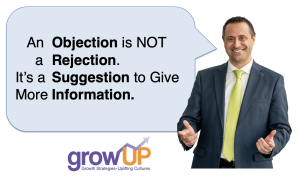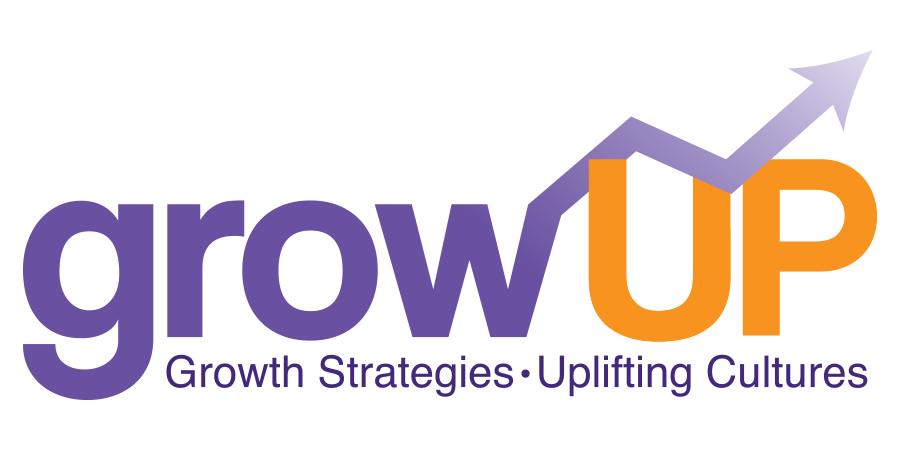
It’s Easy. 3M + 3C = More Clients
June 7, 2021
ONE THING You Must Do To Win Gold
July 23, 2021An Objection Is Not a Rejection.
We all know that it is simply human nature to “fear” (or avoid) rejection. Nobody likes to be rejected. No banker or sales person purposely does anything so they can be rejected. In fact, often the rejection is a surprise.
But rejection happens. And it will always happen …. no matter how good a banker or sales person you are. The key to handling rejection is to never take it personally and to keep it all in perspective.
Another way to overcome your fear of rejection is to perceive these unfavorable responses as a simple OBJECTION.
Definition of OBJECTION: The action of challenging or disagreeing with something.
While a rejection can often feel baseless and confusing, objections are more tangible and you can rationally reason with them.
Many times we may not know (or understand why) we have been rejected, but there is always a reason behind an objection.
Rejection hurts for awhile, but objections are only momentary pain that can be avoided or revelatory.
Semantics or not, I have learned to overcome my sales fears (or limiting beliefs) by focusing on OBJECTIONS rather than REJECTION.
I would always rather someone objected to my call, email or proposal than simply rejected them with no response or a baseless “no thanks”.
Based on the above definition, an objection gives you the opportunity to respond to the client’s challenge or disagreement. It gives you an opportunity to further educate and offer more advice/value. It’s a wonderful opportunity to avoid rejection.

Objections should never be feared. They should be expected, seen as an education opportunity and confidently eliminated.
1. Objection Expectation
Objections normally occur when you do not have an effective outreach or meeting process.
If you call a prospect without a prepared “script” and with a selfish motivation, you are likely to receive an objection. If you meet a prospect and do not effectively understand their needs and decision making process, you are likely to receive an objection.
Avoiding objections will be addressed later, but despite how skilled you may be with prospecting and meeting, it is essential that you be profoundly aware of what objections you could expect.
You see this is why I prefer objections over rejection, because you can LEARN from objections.
Make a list of the most common objections you could expect when calling, meeting or providing a proposal. Don’t assume to know what objections you can expect. Workshop this list with your colleagues. This will enable you to be better prepared and confidently eliminate.
2. Objection Education
As highlighted earlier, the best way to avoid objections is to develop your sales skills, behaviors and beliefs. Create more meaningful prospecting scripts, enhance your meeting process and develop powerful proposals.
In proactively developing these skills, you will also develop better strategies for avoiding objections as you become increasingly more valuable to the prospect.
But objections may still occur. Once you and your colleagues have identified what objections you can expect, the next step is to prepare informative and enlightening responses.
You see clients mainly object because they do not have all the information they need to make a decision and/or they are not confident that they will gain suitable value (or a satisfactory return on their investment).
Therefore the objection is simply a suggestion for you to give more information. Review your list of objections you could expect and prepare responses that make it easier for your prospect/client to make a decision and to recognize the great value they will gain.
3. Objection Elimination
Practice. Practice. Practice.
Practice your outreach script before you call. Practice your meeting process with your colleagues. Practice your proposal presentation. Master these skills and you will significantly reduce the amount of objections you receive.
But as highlighted above, objections still may occur. So practice your prepared objection responses.
Confidently acknowledge the prospect’s objection (concern or excuse), followed by a confident response that makes it easier for your prospect to decide and/or recognize your tremendous value.
Any lack of expectation, preparation and practice will make it hard for you to eliminate the objection. In fact, a lack of practice (including coaching with your team) may validate their objection.
Please don’t wait until you receive a real objection to “practice” your response. Practice regularly with your team, your leader or with other colleagues. Implement a regular coaching program to help you all enhance your skills and become better at eliminating objections.
It’s important to note that there are many types of objections we face in our career and daily lives.
- Client, Prospect and Referrer Objections
- Staff and Leadership Objections
- Personal Objections
Simply apply the above THREE steps and you will stop fearing rejection and start to more confidently manage objections.
But what about the Silent Objection?
There is one more objection type that we regularly encounter …. and that’s the Silent Objection.
This is when we get no response at all following our outreach, meeting and/or proposal.
Please don’t despair, because you haven’t been rejected. The prospect is simply not prepared to make a decision and avoiding contact with you makes it easier for them not to decide.
It is simply another objection even though you may not know exactly what it is. So please continue to apply the above steps and make it very easy for the prospect to make an informed decision.
And even if the decision from your prospect is ultimately “No Thanks” …. this becomes a wonderful opportunity for you to review what you have learned from this experience and improve your future efforts.
Now that doesn’t feel like rejection to me. That feels like a stepping stone to greater learnings and even greater success.
_________________________________________
Article written by Joe Micallef – Sales Strategist & Coach – Grow UP Sales. For more advice on how to handle objections please email joe@growupsales.com or visit the webpage www.growupsales.com
If you found the content valuable then please feel free to share this article with your broader network. Let’s help more bankers and salespeople achieve a better quality of life.





